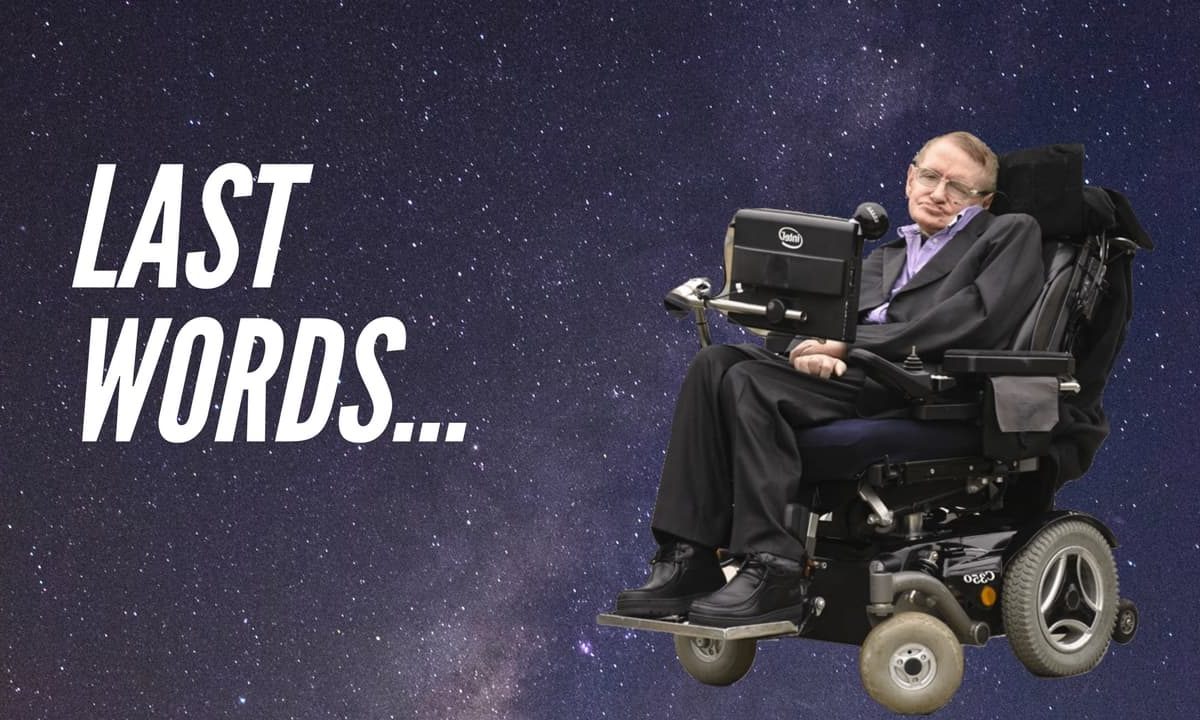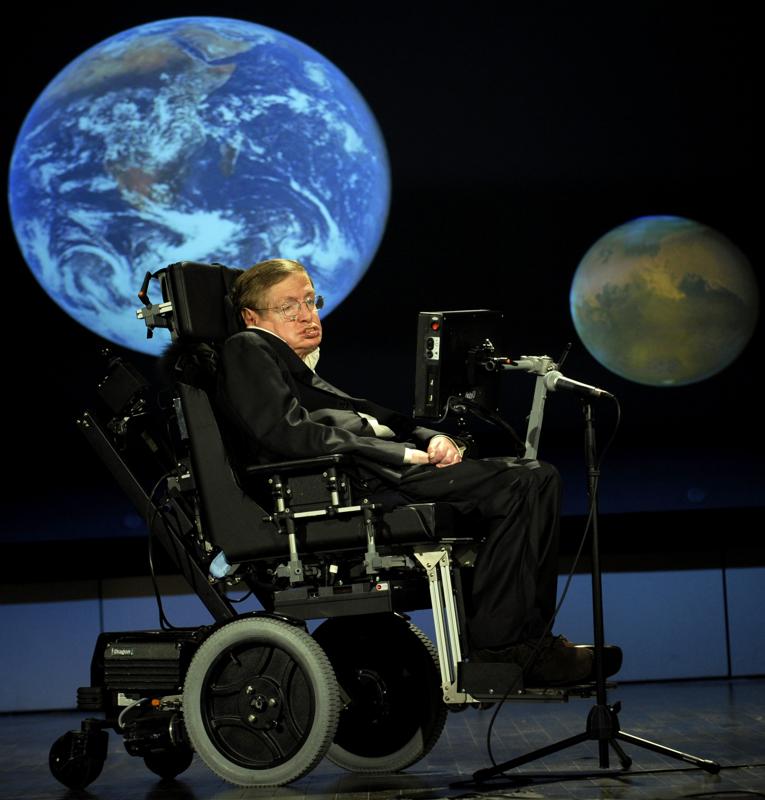Stephen Hawking's Last Words: A Final Message From A Brilliant Mind
When we talk about Stephen Hawking's last words, we're diving into the legacy of a man who changed how humanity views the universe. The legendary physicist didn't just leave behind equations and theories; he left a profound message that continues to inspire millions. Imagine this: one of the greatest minds in history sharing his final thoughts, and we're here to decode what they mean for all of us. So, buckle up, because we're about to explore the final moments of a genius who taught us to dream beyond the stars.
Stephen Hawking wasn’t just a name in the world of science—he was a symbol of resilience, intelligence, and curiosity. His journey from being diagnosed with ALS at 21 to becoming one of the most celebrated physicists in history is nothing short of extraordinary. But what about his final days? What did he want to tell the world before he left? That’s the question we’re digging into today.
Now, you might be wondering why Stephen Hawking's last words matter so much. Well, it’s not just about the words themselves; it’s about the context, the man behind them, and the impact his life had on generations of thinkers. So, whether you’re a science enthusiast, a history buff, or just someone curious about the mysteries of life and death, you’re in the right place.
Read also:What Is The Jamaican Slang For Friend Or Bro Exploring The Vibrant Language Of Jamaica
Table of Contents
- Stephen Hawking's Biography
- The Last Words of Stephen Hawking
- The Impact of His Final Message
- Stephen Hawking's Legacy
- His Contributions to Science
- A Glimpse Into His Personal Life
- Famous Quotes That Resonate Today
- Why Stephen Hawking Still Matters Today
- Final Thoughts
- Sources and References
Stephen Hawking's Biography
Early Life and Education
Stephen Hawking was born on January 8, 1942, in Oxford, England. Coincidentally, this date marked the 300th anniversary of Galileo’s death, setting the stage for Hawking’s destiny as a trailblazer in the world of physics. Growing up, Stephen showed a keen interest in science and mathematics, even though his grades weren’t always stellar. He attended University College, Oxford, where he studied physics and later earned his PhD at Trinity Hall, Cambridge.
Professional Achievements
Stephen Hawking's career was nothing short of groundbreaking. He became known for his work on black holes and the theory of relativity. His book, "A Brief History of Time," became an international bestseller, making complex scientific concepts accessible to the general public. Despite being diagnosed with ALS, a disease that gradually paralyzed him, Hawking continued to contribute to science and inspire millions around the world.
Biographical Data
| Full Name | Stephen William Hawking |
|---|---|
| Date of Birth | January 8, 1942 |
| Place of Birth | Oxford, England |
| Field of Study | Theoretical Physics |
| Major Contributions | Black Hole Theory, Singularity Theorems |
The Last Words of Stephen Hawking
Stephen Hawking's last words were spoken at a conference in Cambridge just months before his passing. He said, “Remember to look up at the stars and not down at your feet. Try to make sense of what you see and wonder about what makes the universe exist. Be curious.” These words encapsulate the essence of his life’s work and his enduring message to humanity.
Now, here’s the thing: Hawking wasn’t just talking about astronomy or physics. He was urging us to embrace curiosity, to challenge the unknown, and to never stop asking questions. His final message wasn’t just for scientists; it was for everyone who dares to dream and explore.
The Impact of His Final Message
Encouraging Curiosity
Hawking’s emphasis on curiosity is more relevant today than ever. In a world dominated by technology and instant answers, his call to look up at the stars reminds us to seek deeper understanding. Curiosity drives innovation, and Hawking’s words inspire us to keep pushing the boundaries of what we know.
Promoting Scientific Literacy
His final message also highlights the importance of scientific literacy. By encouraging people to make sense of the universe, Hawking was advocating for a society where knowledge and critical thinking are valued. This is crucial in an era where misinformation can spread as quickly as truth.
Read also:Discovering Linn Berggren A Rising Star In The Pop Music Scene
Stephen Hawking's Legacy
Stephen Hawking’s legacy extends far beyond his scientific contributions. He showed the world that physical limitations don’t have to define one’s potential. Through his work and his words, he taught us the power of perseverance and the importance of leaving a positive impact on the world.
Inspiring Future Generations
Hawking’s story continues to inspire young minds across the globe. His ability to overcome adversity and achieve greatness serves as a powerful reminder that anything is possible with determination and passion. Whether it’s through his books, lectures, or interviews, his influence lives on in the hearts of those he touched.
His Contributions to Science
Black Hole Radiation
One of Hawking’s most significant contributions was his discovery of black hole radiation, now known as Hawking radiation. This groundbreaking theory changed the way scientists understood black holes, proving that they weren’t entirely black and could emit radiation. His work opened new avenues for research and challenged existing theories about the universe.
The Theory of Everything
Hawking spent much of his career searching for a "theory of everything" that could unify quantum mechanics and general relativity. While the ultimate answer eluded him, his efforts laid the groundwork for future scientists to continue exploring this fundamental question.
A Glimpse Into His Personal Life
Stephen Hawking’s personal life was as fascinating as his professional achievements. He was a devoted family man, a witty conversationalist, and a lover of life despite his physical challenges. His sense of humor and optimism were legendary, and he often used them to connect with people from all walks of life.
Overcoming Adversity
Diagnosed with ALS at the age of 21, Hawking was given just a few years to live. But he defied the odds, living for over five decades and continuing to make groundbreaking contributions to science. His ability to adapt and thrive in the face of adversity is a testament to his resilience and determination.
Famous Quotes That Resonate Today
Stephen Hawking’s words continue to resonate with people around the world. Here are a few of his most famous quotes:
- “The greatest enemy of knowledge is not ignorance, it is the illusion of knowledge.”
- “We are just an advanced breed of monkeys on a minor planet of a very average star. But we can understand the Universe. That makes us something very special.”
- “Life would be tragic if it weren’t funny.”
Why Stephen Hawking Still Matters Today
In a rapidly changing world, Stephen Hawking’s ideas and messages remain as relevant as ever. From climate change to artificial intelligence, his insights offer valuable perspectives on the challenges facing humanity today. His emphasis on curiosity, education, and innovation continues to inspire individuals and organizations worldwide.
Addressing Global Challenges
Hawking was a vocal advocate for addressing global issues such as climate change and the ethical implications of AI. He warned about the dangers of unchecked technological advancement and urged humanity to prioritize sustainability and ethical considerations in our pursuit of progress.
Final Thoughts
Stephen Hawking’s last words remind us to keep looking up, to remain curious, and to never stop questioning. His legacy as a scientist, philosopher, and human being continues to inspire millions around the world. As we reflect on his contributions, let’s remember to honor his memory by embracing the values he stood for.
So, what’s next? Leave a comment below and share your thoughts on Stephen Hawking’s final message. Or, if you’re feeling adventurous, check out some of his books and dive deeper into the mysteries of the universe. After all, that’s what he would’ve wanted us to do.
Sources and References
1. Hawking, Stephen. A Brief History of Time. Bantam Books, 1988.
2. "Stephen Hawking's Final Paper Published." BBC News, BBC, 10 Oct. 2018.
3. "Stephen Hawking Quotes." BrainyQuote, Xplore, www.brainyquote.com/authors/stephen_hawking.


